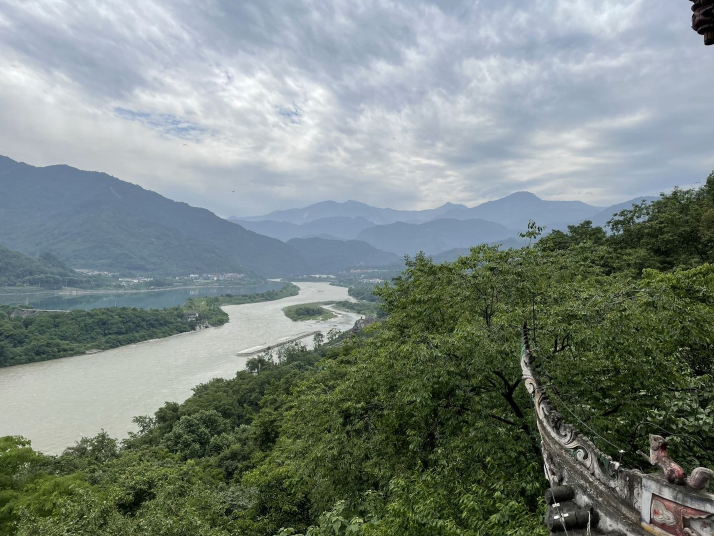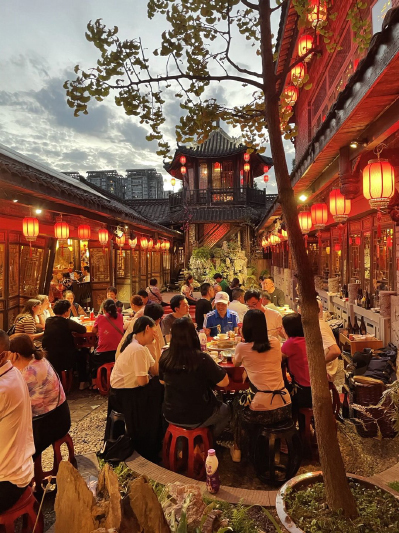| World |
| Chinese and foreign young people explore the charm of Sichuan | |
| International youth appreciate the charm of Sichuan | |
|
|
 The Dujiangyan irrigation system, designed in the 3rd century B.C., is still in operation
Twenty young people from China and other countries of various professional backgrounds met in the heart of southwest China in early June. Their objective was to explore a land of contrasts that can be seen as representative of China in its totality. Tradition & modernity China bridges the gaps between the past, present and future. Ancient culture and modernity are intertwined in its rapid economic growth and daily life. Sichuan Province is no exception. The capital Chengdu is a modern city with an international airport, a symbol of openness to the world and home to international institutions. It is here that the Business and Innovation Center for China-Europe Cooperation (CCEC) found a home in a building of original and futuristic architecture. Although landlocked, Sichuan has always maintained political and economic ties with its Southeast Asian neighbors as well as with Europe and the rest of the world. Another captivating building is the Research Base of Giant Panda Breeding in Chengdu, a non-profit organization dedicated to the study and captive breeding of this cute, intelligent animal. The panda perfectly sums up the singular mentality of the Sichuan people: moving and touching, knowing how to enjoy life, good-natured, but also independent, reserved and having a strong character. "Chengdu has all the qualities of a Chinese metropolis, but the city lives at a much slower pace every day," said Kuang Kai, 33, a professor at Tsinghua University in Beijing, after returning from the trip. "Its residents love sitting on terraces and eat and drink late into the night. Even the variety of culinary specialties shows the importance of quality of life." The most representative gastronomic specialty of Sichuan conviviality is obviously the hotpot. Dinners gather around a table with a pot at the center containing the famous red pepper broth in which everyone dips delicacies. The configuration of this meal invites long discussions and laughter regularly interrupted by toasts. The most popular festive drink in China is baijiu, an alcohol distilled from grain and rice. This beverage accompanies all celebrations. No wonder Wuliangye, one of the country's most iconic brands, has its origins in Yibin, southeastern Sichuan Province. About 10.8 billion liters of baijiu are consumed worldwide each year, mostly in China, according to a study by the International Wine and Spirit Research. Culturally Chengdu is also the center of traditional Sichuan opera which includes fire-eaters and impressive mask-changing (bianlian) performances. Chengdu is simply the "coolest city in China," according to foreigners who live or have lived there.  Traditional opera costume fitting
Man & nature The omnipresence of nature highlights the challenges that civilizations which have succeeded one after the other over centuries have had to face. Irrigation problems, in particular, have so often plunged China into the throes of deadly floods. More than 2,000 years ago, builders developed the Dujiangyan irrigation scheme, a feat of ecological engineering that continues to regulate the waters of the Minjiang River and distribute them to the fertile plains of Chengdu. Overlooking the river is the breathtaking landscape of Mount Qingcheng, cradle of the first organized Taoist school of thought founded by the philosopher Zhang Daoling, and celebrated by perfectly preserved ancient temples. Taoist philosophy advocates that man achieve harmony of body and mind and thus realize an essential link between the dao (the way) and the cosmos. Listed as a UNESCO World Heritage Site since 2000, the site is setting an example in terms of ecology with its carbon neutrality project, testifying to China's desire to continue its development while maintaining harmony between man and nature by nurturing natural and sustainable resources. A visit to the Sanxingdui archaeological site in the western suburb of Guanghan city is proof that discoveries can call cultural origins into question. These relics never cease to amaze archaeologists especially as their style is not at all similar to the Chinese art of the same period. The bronze objects show an advanced technique for the time (2800-800 B.C.). "The most impressive thing is the appearance of the sculptures and the representation of their forward-looking eyes with telescopic eyes," said Mehad Mosua, 26, an Egyptian doctoral research student at Northwest University in northwest China's Shaanxi Province. Sometimes nature takes over from man, who is powerless in the face of natural disasters. On May 12, 2008, it was as if the sky fell down on the residents of Yingxiu in Wenchuan County.  Unparalleled sweetness of dining in Sichuan Province
A deadly magnitude 8 earthquake shifted the ground beneath their feet, devastating the area including Xuankou Elementary School. The tremors were felt nearly 2,000 km away in Shanghai and Beijing. The town which has been completely rebuilt a few steps away gives no hint of its heavy past. Its welcoming inhabitants give a beautiful lesson in resilience and hope. Jiang Weiming, a local resident, received this group of young people on June 6 at his tea plantation for a tasting of his fragrant products. The journey ended in Shunan Zhuhai, a preserved bamboo forest that supplied a filming location for Ang Lee's Crouching Tiger, Hidden Dragon (2000), which won the best foreign film Oscar. Covered with greenery and a real breath of fresh air, the forest leaves the impression of floating in a small paradise. Local gastronomy features a whole range of dishes containing bamboo and so could not have any other name than the "kitchen of the pandas." (Print Edition Title: Witnessing Duality and Resilience) Comments to zanjifang@chinafrica.cn |
|
||||||||||||||||||||||||||||
|